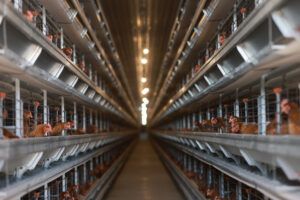Some 93% of global food giants have been given the lowest ratings (‘E’ or ‘F’) based on their performance impact in the latest Business Benchmark on Animal Welfare (BBAW) report, with investors such as Aviva, Candriam and Robeco set to engage food companies over the findings.
A ‘Performance Impact’ assessment analyses the tangible impact on the lives of farm animals reared for food in corporate supply chains. For example, progress on issues such as the time farm animals spend in live transportation, in close confinement such as gestation crates, or routine mutilation remains disappointingly slow, according to the report.
That is despite the fact that 95% of global food companies acknowledged the importance of animal welfare and said they were addressing it with policy commitments and clearer governance.
A total of 150 global food producers, retailers and food-service companies with combined revenues of more than $4.9trn, including the likes of McDonalds, Tesco and Tyson Foods, were ranked by BBFAW, which relaunched this year and introduced tougher assessment criteria while increasing its focus on ’Performance Impact’. It also included new questions on how companies are recognising the need to reduce reliance on animal-sourced foods and diversify into alternative proteins.
BBFAW was originally launched in 2012 and is supported by partners Compassion in World Farming and FOUR PAWS, and by a coalition of institutional investors managing over $1.9trn in assets.
Nicky Amos, executive director of the BBFAW, said: “The BBFAW results show that for 95% of food companies protecting farm animal welfare is not about businesses doing good; it’s about good business. Our analysis shows there’s a long way to go for the food sector to turn awareness and commitment into demonstrable animal welfare benefits, with large numbers of farmed animals still suffering from inhumane practices such as close confinement or routine mutilations.“
Findings
The report found that implementation lags behind commitment to animal welfare. While 93% were rated ‘E’ or ‘F’, in contrast, no firm achieved the top ‘A’ or ‘B’ impact rating.
Other findings include:
- Only 27% of assessed companies reported that live transportation of farm animals was restricted to short journeys only (i.e. four hours or less for poultry and rabbits, and eight hours for other species).
- 18% of companies have no policy commitment to end the use of close confinement, and only 9% of companies with pigs in their supply chain (13 of 137 companies) have set credible targets to end the use of ‘sow stalls’ or ‘gestation crates’ (i.e. metal enclosures barely bigger than an adult pig which are banned in jurisdictions such as the UK, Sweden and several US states).
- Only 40% of companies have commitments in place to end prophylactic and routine metaphylactic antibiotic use – despite the risk of surging antibiotic resistance.
However, the benchmark found some positive signals too. The vast majority of businesses (95%) now identify farm animal welfare as a relevant business issue, up from 79% in 2012; 25% recognised the need to reduce reliance on animal-sourced foods as a relevant issue; and three companies – Marks & Spencer, Premier Foods and Waitrose – achieved ‘tier 2’ status, showing leadership in making farm animal welfare integral to their business strategy.
Amos added: “With the benchmark’s criteria having been strengthened in 2024, it’s encouraging several companies have begun to lead by example and show high levels of progress are possible.”
Investor engagement
The coalition of 32 institutional investors that have already pledged support for the BBFAW are set to engage with food companies about the latest results to drive improvement.
Abigail Herron, global head of health and nature policy at Aviva Investors, commented: “The BBAW continues to be a valuable guide in helping investors analyse management quality systematically and consistently across the global food industry. Importantly, this data also exists at the intersection between critical issues including animal welfare and antimicrobial resistance, which present material financial risks to companies and shareholder returns.
“As an investor which regularly engages with companies operating in the global food sector, the BBAW helps to shine a light on those which are making critical progress towards addressing these challenges and enables us to analyse management quality in a systematic and consistent manner.”
This story first appeared in our sister publication, PA future.
